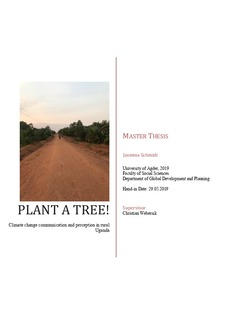| dc.description.abstract | The impacts of climate change are one of the most pressing issues in our times. Thus, climate change mitigation and adaptation strategies are of key importance in development. For individuals to employ adaptation strategies, a perception of risk towards climate change is necessary which is mostly received through communicative activities. Not only is riskperception dependent on communication, also climate change is a topic that is mainly spread through communicative activities. Little has been done about the perception of climate change in Africa in general and Uganda in particular.Therefore, the objective of this Master thesis wasto find out how the framing of climate change in communication affects the risk perception of men and women in rural Uganda. The principals of feminist research wereapplied in this thesis.For the research design, a case study was selected. First, it was looked into the case of media reporting of climate change. Therefore, a qualitative content analysis was utilized to get a better understanding about how climate change is framed in media in Uganda. Following, a community in Eastern Uganda in Jinja District was studied to find out how climate change is perceived by people directly affected by it. This was done through qualitative interviews, focus group discussions and participant observation. The conducted research showed that the concept of climate change is not a familiar subject for most people in the community. As knowledge is a considerable contributor to risk perception, this unfortunately ceased to apply. However, people do experience a change in climate, mostly in the form of more occurring droughts. Those perceptions of a changing climate did not differ much in relation to gender. A more contributing factor of that was age and experience in farming. The community members have an explanatory model for more occurring droughts that stresses the importance of trees. This could also be observed in the framing of newspaper reporting where the focus was set on individual action and planting trees. Climate change is often outlined more in the sense of environmental degradation and the issue of emissions is rarely discussed. Clearly, emissions are not a big topic in Uganda as the country is responsible for only a marginal degree of global emissions. However, omitting this point in the explanation of globalclimate change can lead to single-sided explanatory models and false conclusions about causal relationships. | nb_NO |

